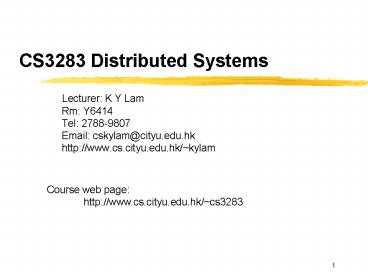CS3283 Distributed Systems - PowerPoint PPT Presentation
1 / 9
Title:
CS3283 Distributed Systems
Description:
To introduce the important basic concepts, problems and algorithms ... Distributed System, Principles and Paradigms, Andrew S. Tanenbaum and Maarten van Steen ... – PowerPoint PPT presentation
Number of Views:232
Avg rating:3.0/5.0
Title: CS3283 Distributed Systems
1
CS3283 Distributed Systems
- Lecturer K Y Lam
- Rm Y6414
- Tel 2788-9807
- Email cskylam_at_cityu.edu.hk
- http//www.cs.cityu.edu.hk/kylam
Course web page http//www.cs.cityu.edu.hk/cs3
283
2
Course Objectives
- To introduce the important basic concepts,
problems and algorithms in distributed computing - To introduce the key system design issues in
distributed systems, particularly in the areas of
system architectures and models, inter-process
communication, name services, time-global states
management, coordination and agreement,
transactions and concurrency control, distributed
transactions and replication management, and new
developments in distributed systems - Understand the basic techniques and algorithms
for resolving the basic design problems in
distributed systems - Concentrate on concepts, problems and algorithms
instead of tools for distributed computing
systems programming - In distributed programming, you learn HOW to do
- In here, you will learn WHY to do them in these
ways - Requirements (problems gt solutions), tradeoffs
and benefits (no perfect solutions)
3
Assessment and Coursework
- Assessment
- Examination 70 (2 hours exam)
- Coursework 30 (report, quiz and assignment)
- Conceptual and theoretical (exam)
- Examination (70) will concentrate on the
conceptual and theoretical materials introduced
in the lectures - Report 6 (around week 5)
- Quiz 12 (around week 8)
- Assignment 12
- Details will be passed to you in week 4/5
4
Class Schedule (tentative)
- Introduction to Distributed Systems (week 1)
- System Models (week 2)
- Multiprocessing and Multithreading (week 3)
- Inter-process Communication (weeks 4-5)
- Name Services (week 6)
- Time and Global States (week 7)
- Quiz (week 8)
- Coordination and Election (week 9)
- Distributed Transactions (week 10)
- Replication and Consistency (weeks 11 -12)
- New Developments in Distributed Systems and
revision (week 13)
5
Text Book and References
- Text Book
- Distributed System, Concepts and Design, Fourth
Edition, George Coulouris, Jean Dollimore Tim
Kindberg - Reference Book
- Distributed System, Principles and Paradigms,
Andrew S. Tanenbaum and Maarten van Steen - Resources
- http//code.google.com/edu/parallel/index.html
- http//www.cs.rutgers.edu/pxk/rutgers/syllabus.ht
ml
6
Some Suggestions
- How to take this course
- Attend all (most) the lectures/tutorials
- Read the handouts before and after the lectures
- Read the text/reference books (and other related
materials) - To attend the quiz
- To complete the assignments and exercises
- Not just memorize the keywords and concepts
- Need to know the problems, and then the
solutions, and also the underlying principles - Just to remind, according to CityU regulations,
1 credit unit is earned by approximately 40-50
hours of student work over a semester (including
lectures/tutorials/lab, assignments, and study).
For a typical 3 credit unit course, with 3 hours
lecture/tutorial/lab, a student should spend
roughly 80 to 110 hours of additional work
outside of class (each week 3-4hr 40-60hr for
assignment works)
7
My Expectations
- Meet the course learning objectives
- You will have your own understandings of what a
distributed system is, and the fundamental
problems and basic solutions for solving these
problems - You should not just copy other peoples idea. You
should develop your own understandings - You will be able to
- Express your own understandings in the area to
computer professionals - Have your own opinions learnt from this course
for solving real world problems - Relate the knowledge from this course to other
courses that you have learnt and going to take - Your understandings on how to learn and study
- Your understandings on how to become a good
computer professional, a good member in the
society, and a good man
8
What are your expectations?
- ????
- To obtain a good grade from this course (A, B, C,
) and then finish the degree - LASSI Test Scores
- ATT 15 (Attitudes and interest in academic
studies) - MOT 25 (Diligence, self-discipline, and
willingness in learning) - ANX 51 (Worries about attending University and
academic performance) - No interests in learning and also not willing to
learn. So, I worry about my future in here. - So, what do you want?
- My suggestions
- No need to worry too much. You should be able to
obtain a good result if you - Work hard
- Follow my teaching and my suggestions
- Motivate yourselves as a good result is very
important to your future and the knowledge from
here will be useful (directly and indirectly) for
your whole life. It is a kind of training and
exercises to prepare you for the future. The real
problems in the future will be much more difficult
9
Top
10
30
60
bottom
Where are you now?
What do you want to be?

